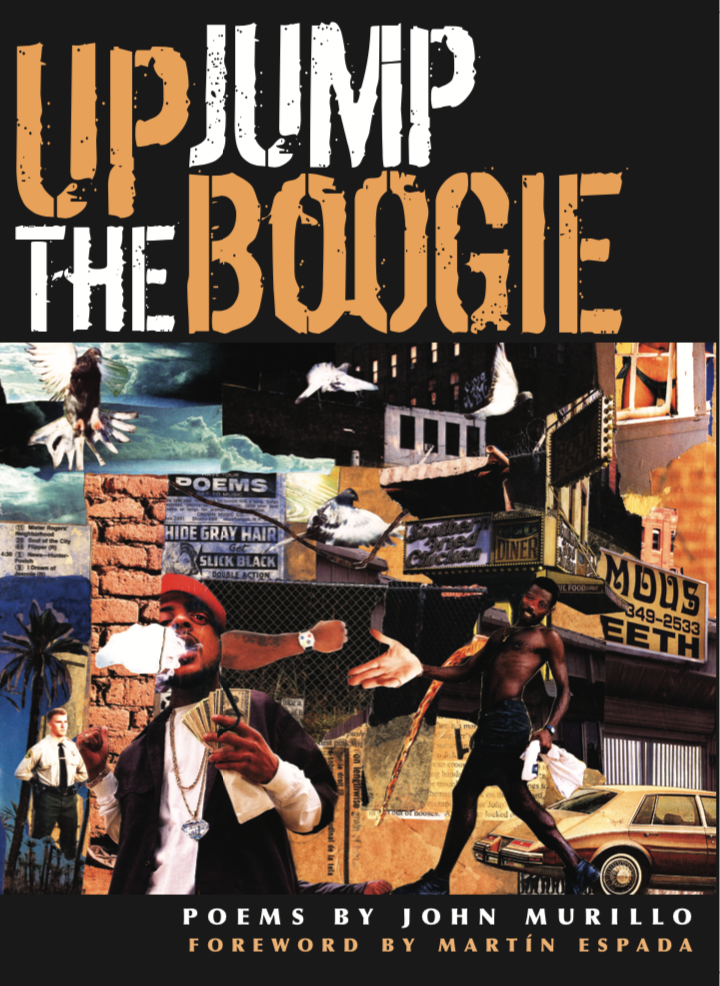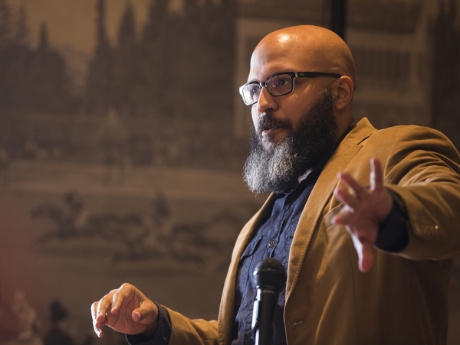
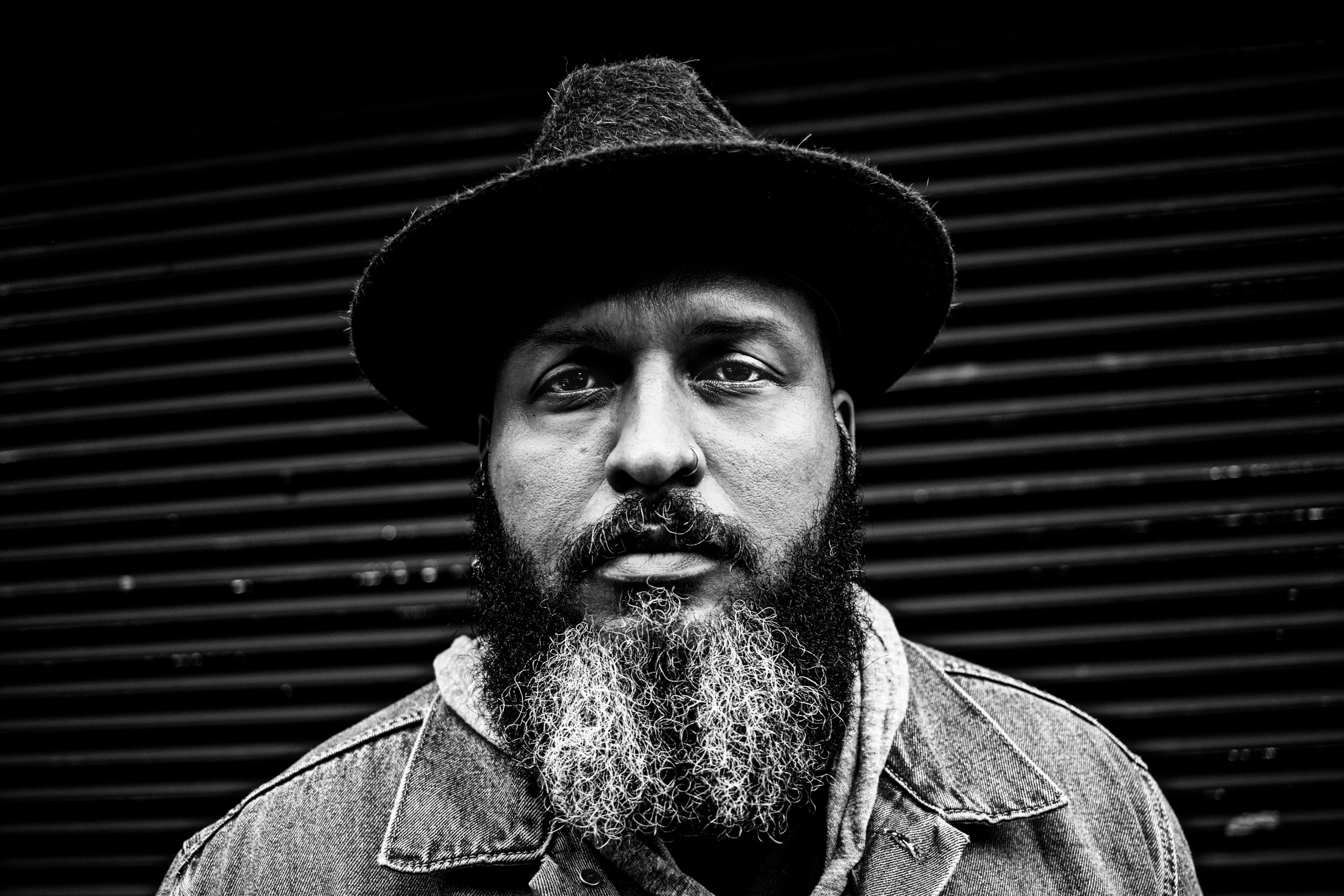
John Murillo
Award-winning Poet
Kingsley Tufts Poetry Award Winner
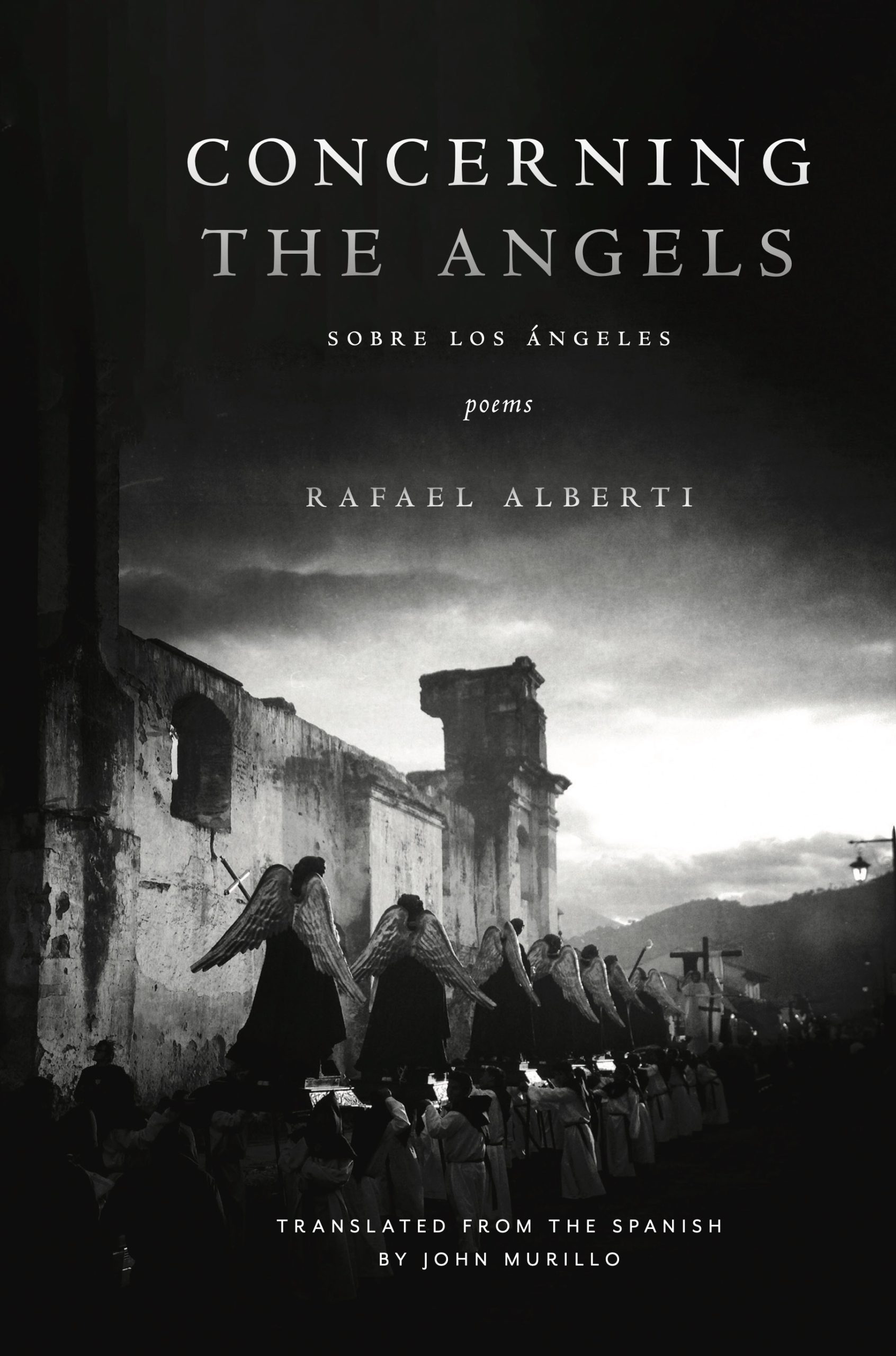
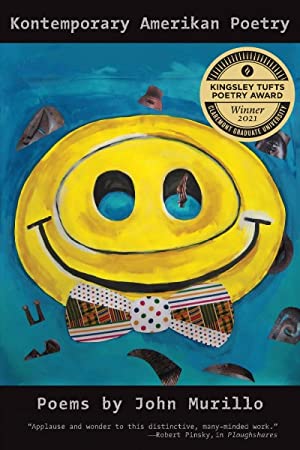
Readings &
Lecture Topics
- The Art (and Craft) of Duende
- Sprezzatura and the Beauty of B.H. Fairchild: A Short Talk on the Long Poem
- The Ethics of Confession, Witness, and Elegy
- “Gimme the Loot”: How to Steal Like a Poet
- An Evening with John Murillo
Biography
“Murillo is a poet for his time, equal to its urgency, and graced are we to have him among us in this time of need.” —Carolyn Forché
“[These] poems juxtapose bruising firsthand experience against dry conceptual categories. Murillo’s rage against stereotypes and systemic injustice burns through these poems.” —Publishers Weekly
“There is in John Murillo’s art a dogged Americanness, a poet determined to assert himself within an America that has sought to deny his song and the songs from the rich African American tradition.” —Kwame Dawes
John Murillo is the author of the poetry collections Up Jump the Boogie (Four Way Books, 2020; Cypher, 2010), which was a finalist for both the Kate Tufts Discovery Award and the Pen Open Book Award; and Kontemporary Amerikan Poetry (Four Way, 2020), winner of the Kingsley Tufts Poetry Award and the Poetry Society of Virginia’s North American Book Award, and a finalist for the PEN/Voelcker Award for Poetry, and the NAACP Image Award. With poet Nicole Sealey, he edited the anthology Dear Yusef: Essays, Letters and Poems, for and about One Mr. Komunyakaa. His first full-length translation, Concerning the Angels (Four Way Books, 2025), is a book of poetry by the celebrated Spanish poet, Rafael Alberti.
Murillo’s second book, Kontemporary Amerikan Poetry, is a reflective look at the legacy of institutional, accepted violence against Blacks and Latinos and the personal and societal wreckage wrought by long histories of subjugation. Carolyn Forché describes the collection as, “a lyric burst of virtuosity and passion long in coming, something between song and prayer, centered on a fifteen-sonnet redoublé on the subject of murderous racism and the rage that pushes against it, the whole of the book becoming an ars poetica for memory as noose and history as burning church.”
He has received honors ranging from the Four Quartets Prize from the T.S. Eliot Foundation and the Poetry Society of America, two Larry Neal Writers Awards, a pair of Pushcart Prizes, the J Howard and Barbara MJ Wood Prize from the Poetry Foundation, to fellowships from the National Endowment for the Arts, the Bread Loaf Writers Conference, Fine Arts Work Center, and Cave Canem.
Murillo’s poems have appeared in American Poetry Review, Poetry, and Best American Poetry 2017, 2019, and 2020.
Currently, he is professor of English and teaches in the MFA program at Hunter College.
Short Bio
John Murillo is the author of the poetry collections Up Jump the Boogie, finalist for both the Kate Tufts Discovery Award and the Pen Open Book Award, and Kontemporary Amerikan Poetry, winner of the Kingsley Tufts Poetry Award and the Poetry Society of Virginia’s North American Book Award, and finalist for the PEN/Voelcker Award for Poetry, the Hurston-Wright Legacy Award and the NAACP Image Award. His first full-length translation, Concerning the Angels is a book of poetry by the celebrated Spanish poet, Rafael Alberti. His other honors include the Four Quartets Prize from the T.S. Eliot Foundation and the Poetry Society of America, the Lucille Clifton Legacy Award from St. Mary’s College of Maryland, two Pushcart Prizes, two Larry Neal Writers Awards from the DC Commission on the Arts and Humanities, the J Howard and Barbara MJ Wood Prize from the Poetry Foundation, an NYSCA/NYFA Artist Fellowship, and fellowships from the National Endowment for the Arts, MacDowell, the Bread Loaf Writers Conference, Fine Arts Work Center in Provincetown, New York Times, Cave Canem, and the Wisconsin Institute for Creative Writing. Currently, he is professor of English and teaches in the MFA program at Hunter College.
Visit Author WebsiteVideos
Publications
Concerning the Angels
Poetry, 2025
In his first full-length translation, celebrated poet John Murillo (Winner of the Kingsley Tufts Award and the Four Quartets Prize) brings Rafael Alberti’s Concerning the Angels (Sobre los ángeles) to an English-reading audience. Murillo’s foreword introduces Sobre los ángeles as “a monument—albeit a severely neglected monument—of early twentieth-century literature.” Despite having “penned a masterwork of social and psychic malaise as deserving as any of its place in the global canon,” Alberti has disappeared into relative obscurity among readers of English language poetry, and Murillo’s crucial intervention allows the Spanish poet’s voice to once again echo prophetically from this book’s opening poem, “Paradise Lost”: “throughout the centuries, / through the nothingness of the world, / I, without sleep, search for you.” Insofar as the speaker addresses a figure named Shadow, he also seems to imagine us, his future readers, who need these prescient lyrics written in the time leading up to Spain’s civil war and ensuing decades of fascist rule. Bringing his signature gifts to translating from the Spanish, Murillo has given new life to what many consider Alberti’s magnum opus and delivered our marching orders for the resistance the future will require. “It is time you gave me your hand / and scratched into me the little light that catches a hole as it closes / and killed for me this evil word I plan to plunge into the thawing earth.”
Kontemporary Amerikan Poetry
Poetry, 2020
John Murillo’s second book is a reflective look at the legacy of institutional, accepted violence against Blacks and Latinos and the personal and societal wreckage wrought by long histories of subjugation. A sparrow trapped in a car window evokes a mother battered by a father’s fists; a workout at an iron gym recalls a long-ago mentor who pushed the speaker “to become something unbreakable.” The presence of these and poetic forbears—Gil Scott-Heron, Yusef Komunyakaa—provide a context for strength in the face of danger and anger. At the heart of the book is a sonnet crown triggered by the shooting deaths of three Brooklyn men that becomes an extended meditation on the history of racial injustice and the notion of payback as a form of justice.
Up Jump The Boogie
Poetry, 2020 & 2010
“The feel of now lives in John Murillo’s Up Jump The Boogie, but it’s tempered by bows to the tradition of soulful music and oral poetry. The lived dimensions embodied in this collection say that here’s an earned street knowledge and a measured intellectual inquiry that dare to live side by side, in one unique voice. The pages of Up Jump The Boogie breathe and sing; the tributes and cultural nods are heartfelt, and in these honest poems no one gets off the hook. —Yusef Komunyakaa
Articles & Audio
Read What’s In Print
• How to Write on a Ledge: An Interview with John Murillo – The Common
• In Silence and In the Streets: A Conversation with John Murillo – The Adroit Journal
• Dora Malech Interviews John Murillo – Tupelo Quarterly
• The Pen Ten with John Murillo – PEN America
• DOGBYTES Interview: John Murillo – Cave Canem
• Book Review: John Murillo’s Kontemporary Amerikan Poetry – Mano Magazine
• Out of Rage, Art: An Interview with John Murillo by Cate Lycurgus – 32poems
• Review of Kontemporary Amerikan Poetry by John Murillo – Publishers Weekly
Listen to Audio
• Voca: A Poetry Reading with John Murillo – UAZ Poetry Center
Selected Writings
• Read “Mercy, Mercy, Me” – Academy of American Poets
• Read “Variation On A Theme By Gil Scott-Heron” – The Los Angeles Review
• Read “Upon Reading that Eric Dolphy Transcribed Even the Calls of Certain Species of Birds” – The Poetry Foundation
• Read “A Refusal to Mourn the Deaths, by Gunfire, of Three Men in Brooklyn” – American Poetry Review
On Confessionalism
Not sleepwalking, but waking still,
with my hand on a gun, and the gun
in a mouth, and the mouth
on the face of a man on his knees.
Autumn of ’89, and I’m standing
in a section 8 apartment parking lot,
pistol cocked, and staring down
at this man, then up into the mug
of an old woman staring, watering
the single sad flower to the left
of her stoop, the flower also staring,
my engine idling behind me, a slow
moaning bassline and the bark
of a dead rapper nudging me on.
All to say, someone’s brokenhearted.
And this man with the gun in his mouth—
this man who, like me, is really little
more than a boy—may or may not
have something to do with it.
May or may not have said a thing
or two, betrayed a secret, say,
that walked my love away. And why
not say it: She adored me. And I,
her. More than anyone, anything
in life, up to then, and then still,
for two decades after. And, therefore,
went for broke. Blacked out and woke
having gutted my piggy and pawned
all my gold to buy what a homeboy
said was a Beretta. Blacked out
and woke, my hand on a gun, the gun
in a mouth, a man, who was really
a boy, on his knees. And because
I loved the girl, I actually paused
before I pulled the trigger—once,
twice, three times—then panicked
not just because the gun jammed,
but because what if it hadn’t,
because who did I almost become,
there, that afternoon, in a section 8
apartment parking lot, pistol cocked,
with the sad flower staring, because
I knew the girl I loved—no matter
how this all played out—would never
have me back. Day of damaged ammo,
or grime that clogged the chamber.
Day of faulty rods, or springs come
loose in my fist. Day nobody died,
so why not hallelujah? Say amen or
Thank you? My mother sang for years
of God, babes and fools. My father,
lymph node masses fading from
his x-rays, said surviving one thing
means another comes and kills you.
He’s dead, and so, I trust him. Dead,
and so I’d wonder, years, about the work
I left undone—boy on his knees
a man now, risen, and likely plotting
his long way back to me. Fuck it.
I tucked my tool like the movie gangsters
do, and jumped back in my bucket.
Cold enough day to make a young man
weep, afternoon when everything,
or nothing, changed forever. The dead
rapper grunted, the bassline faded,
my spirits whispered something
from the trees. I left then lost the pistol
in a storm drain, somewhere between
that life and this. Left the pistol
in a storm drain, but can’t remember
ever wiping away my prints.

